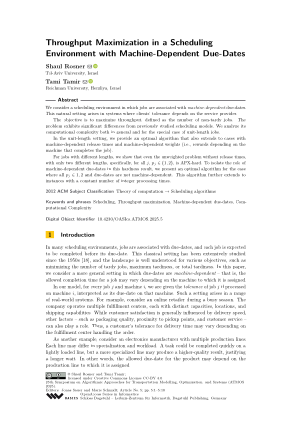Throughput Maximization in a Scheduling Environment with Machine-Dependent Due-Dates
Authors
Shaul Rosner  ,
Tami Tamir
,
Tami Tamir 
-
Part of:
Volume:
25th Symposium on Algorithmic Approaches for Transportation Modelling, Optimization, and Systems (ATMOS 2025)
Part of: Series: Open Access Series in Informatics (OASIcs)
Part of: Conference: Symposium on Algorithmic Approaches for Transportation Modelling, Optimization, and Systems (ATMOS) - License:
 Creative Commons Attribution 4.0 International license
Creative Commons Attribution 4.0 International license
- Publication Date: 2025-10-17
File

PDF
OASIcs.ATMOS.2025.5.pdf
- Filesize: 0.79 MB
- 10 pages
Document Identifiers
Subject Classification
ACM Subject Classification
- Theory of computation → Scheduling algorithms
Keywords
- Scheduling
- Throughput maximization
- Machine-dependent due-dates
- Computational Complexity
Metrics
- Access Statistics
-
Total Accesses (updated on a weekly basis)
0PDF Downloads0Metadata Views
Abstract
We consider a scheduling environment in which jobs are associated with machine-dependent due-dates. This natural setting arises in systems where clients' tolerance depends on the service provider.
The objective is to maximize throughput, defined as the number of non-tardy jobs. The problem exhibits significant differences from previously studied scheduling models. We analyze its computational complexity both in general and for the special case of unit-length jobs.
In the unit-length setting, we provide an optimal algorithm that also extends to cases with machine-dependent release times and machine-dependent weights (i.e., rewards depending on the machine that completes the job).
For jobs with different lengths, we show that even the unweighted problem without release times, with only two different lengths, specifically, for all j, p_j ∈ {1,2}, is APX-hard. To isolate the role of machine-dependent due-dates in this hardness result, we present an optimal algorithm for the case where all p_j ∈ {1,2} and due-dates are not machine-dependent. This algorithm further extends to instances with a constant number of integer processing times.
Cite As Get BibTex
Shaul Rosner and Tami Tamir. Throughput Maximization in a Scheduling Environment with Machine-Dependent Due-Dates. In 25th Symposium on Algorithmic Approaches for Transportation Modelling, Optimization, and Systems (ATMOS 2025). Open Access Series in Informatics (OASIcs), Volume 137, pp. 5:1-5:10, Schloss Dagstuhl – Leibniz-Zentrum für Informatik (2025)
https://doi.org/10.4230/OASIcs.ATMOS.2025.5
BibTex
@InProceedings{rosner_et_al:OASIcs.ATMOS.2025.5,
author = {Rosner, Shaul and Tamir, Tami},
title = {{Throughput Maximization in a Scheduling Environment with Machine-Dependent Due-Dates}},
booktitle = {25th Symposium on Algorithmic Approaches for Transportation Modelling, Optimization, and Systems (ATMOS 2025)},
pages = {5:1--5:10},
series = {Open Access Series in Informatics (OASIcs)},
ISBN = {978-3-95977-404-8},
ISSN = {2190-6807},
year = {2025},
volume = {137},
editor = {Sauer, Jonas and Schmidt, Marie},
publisher = {Schloss Dagstuhl -- Leibniz-Zentrum f{\"u}r Informatik},
address = {Dagstuhl, Germany},
URL = {https://drops.dagstuhl.de/entities/document/10.4230/OASIcs.ATMOS.2025.5},
URN = {urn:nbn:de:0030-drops-247616},
doi = {10.4230/OASIcs.ATMOS.2025.5},
annote = {Keywords: Scheduling, Throughput maximization, Machine-dependent due-dates, Computational Complexity}
}
Author Details
References
- A. Bar-Noy, S. Guha, J. Naor, and B. Schieber. Approximating the throughput of multiple machines in real-time scheduling. SIAM J. Comput., 31(2):331-352, 2001. URL: https://doi.org/10.1137/S0097539799354138.
- D. Briskorn and S. Waldherr. Anarchy in the U_j: Coordination mechanisms for minimizing the number of late jobs. European Journal of Operational Research, 301(3):815-827, 2022. URL: https://doi.org/10.1016/j.ejor.2021.11.047.
- J. L. Bruno, E. G. Coffman Jr., and R. Sethi. Scheduling independent tasks to reduce mean finishing time. Commun. ACM, 17(7):382-387, 1974. URL: https://doi.org/10.1145/361011.361064.
- C. Durr and M. Hurand. Finding total unimodularity in optimization problems solved by linear programs. In 14th European Symp. on Algorithms (ESA), 2006. URL: https://doi.org/10.1007/11841036_30.
-
R. L. Graham, E. L. Lawler, J. K. Lenstra, and A. H. G. Rinnooy Kan. Optimization and approximation in deterministic sequencing and scheduling: a survey. Ann. Discrete Math, 5:287-326, 1979.

-
N. G. Hall. Scheduling problems with generalized due dates. IIE Transactions, 18(2):220-222, 1986.

- W. A. Horn. Technical note - minimizing average flow time with parallel machines. Operations Research, 21(3):846-847, 1973. URL: https://doi.org/10.1287/opre.21.3.846.
- D. Hyatt-Denesik, M. Rahgoshay, and M. R. Salavatipour. Approximations for throughput maximization. Algorithmica, 86:1545-1577, 2024. URL: https://doi.org/10.1007/s00453-023-01201-4.
- V. Kann. Maximum bounded 3-dimensional matching is max snp-complete. Information Processing Letters, 37:27-35, 1991. URL: https://doi.org/10.1016/0020-0190(91)90246-E.
- E. L. Lawler. Recent results in the theory of machine scheduling. In A. Bachem, M. Groetschel, and B. Korte, editors, Mathematical Programming: The State of the Art, pages 202-234. Springer, 1982. URL: https://doi.org/10.1007/978-3-642-68874-4_9.
-
J. K. Lenstra and A. H. G. Rinnooy Kan. Computational complexity of discrete optimization problems. Ann. Discrete Math., 4:121-140, 1979.

- J. K. Lenstra, D. B. Shmoys, and É. Tardos. Approximation algorithms for scheduling unrelated parallel machines. Mathematical Programming, 46:259-271, 1990. URL: https://doi.org/10.1007/BF01585745.
-
L. Lovász and M. D. Plummer. Matching theory, volume 367. American Math Soc., 2009.

-
M. J. Moore. An n job, one machine sequencing algorithm for minimizing the number of late jobs. Management Science, 15(1):102-109, 1968.

- B. Mor, G. Mosheiov, and D. Shabtay. Scheduling problems on parallel machines with machine-dependent generalized due-dates. Ann Oper Res., 2025. URL: https://doi.org/10.1007/s10479-025-06468-0.
- C. H. Papadimitriou and M. Yannakakis. Optimization, approximation, and complexity classes. Journal of Computer and System Sciences, 43(3):425-440, 1991. URL: https://doi.org/10.1016/0022-0000(91)90023-X.
- E. Petrank. The hardness of approximation: gap location. Computational Complexity, 4(2):133-157, 1994. URL: https://doi.org/10.1007/BF01202286.
-
M. Pinedo. Scheduling: theory, algorithms, and systems. Springer, 2008.

- J. Sgall. Open problems in throughput scheduling. In 20th European Symp. on Algorithms (ESA), 2012. URL: https://doi.org/10.1007/978-3-642-33090-2_2.
- V. R. Vijayalakshmi, M. Schröder, and T. Tamir. Minimizing total completion time with machine-dependent priority lists. European J. of Operational Research, 315(3):844-854, 2024. URL: https://doi.org/10.1016/j.ejor.2023.12.030.
